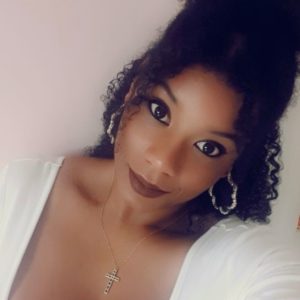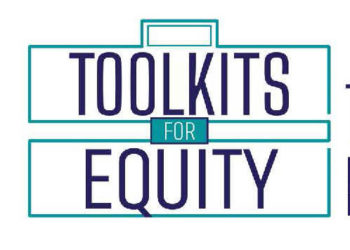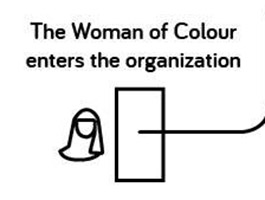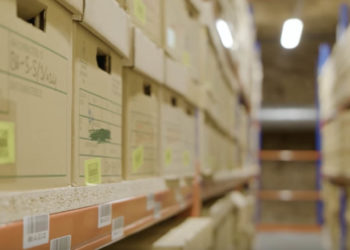Editor’s Note: We are thrilled to announce the appointment of Dianndra Roberts as the Diversity, Equity, Inclusion, and Accessibility (DEIA) Associate Editor for The Scholarly Kitchen. After an exhaustive search with some truly amazing candidates, Dianndra stood out as someone with a deep knowledge of scholarly publishing and a strong commitment to advocating for diversity, equity, inclusion, and accessibility. Dianndra is the Senior Publishing Coordinator for the Royal College of Psychiatrists, founded and chairs that organization’s African and Caribbean Forum, and serves on the ISMTE’s DEI Advisory Council. We at The Scholarly Kitchen are looking forward to learning from Dianndra and thank her in advance for the support she’ll provide to our Chefs and guest authors. Below, Dianndra offers her thoughts on what she hopes to accomplish here in The Kitchen.
 My interest and investment in DEIA started when I was a small observant child. I never understood why we did not try more to meet people where they are at. I always questioned why we weren’t doing what was needed to ensure everyone can be the best versions of themselves and have the best opportunities with the right resources. As I got older, I continued to speak out, not just for myself, but for others who I could see were being sidelined in a way I could relate to, all too well. We have not all started this race (life) at the same point — there are a number of factors that have people starting at different distances to success. That is why sometimes we need to meet people where they are at and give them the specific resources, support, and tools to get to where others have started.
My interest and investment in DEIA started when I was a small observant child. I never understood why we did not try more to meet people where they are at. I always questioned why we weren’t doing what was needed to ensure everyone can be the best versions of themselves and have the best opportunities with the right resources. As I got older, I continued to speak out, not just for myself, but for others who I could see were being sidelined in a way I could relate to, all too well. We have not all started this race (life) at the same point — there are a number of factors that have people starting at different distances to success. That is why sometimes we need to meet people where they are at and give them the specific resources, support, and tools to get to where others have started.
Last year I curated a conference session titled “Bringing Your Whole Self to Work”. I went out of my way to find a range of speakers who were comfortable to speak their truths — many noting imposter syndrome, discrimination, and assimilation. I appreciated everyone being so open with their truth, but it made me wonder whether I have ever brought my whole self to work. The first time I wore my natural hair in the workplace, I was 24 years old, and I was 26 years old when I went to work with braids. I would be lying if I said no one tried to touch my hair and everyone was very respectful, but all that aside, this was an enormous moment for me. I’ve always been a natural-hair-curly-girl and with that comes the critiques of “unprofessional”, “distracting” hair. I once had my hair called suspicious when going through airport security (of course, I was randomly selected for a search). It took me a few attempts to build up the courage to bring this natural part of myself to work. and since then I haven’t gone back.
We need to support those around us who often wonder how much of themselves they can be in the workplace, in their industry, or just outside of their home. We need to support and be allies for marginalized groups and those who we are in daily contact with. No one is asking anyone to get on a white horse and save the day, but consider using the platform you have, to normalize and spread awareness of the needs of others. We all have a privilege in some way, and we can absolutely use it in a positive light to amplify the voices of those who are usually overlooked.
Everyone has a space where their voice is prioritized, and we need to use that in support of others because we will all benefit from amplifying marginalized communities. Any area of your life where you have not had to worry about it as a discriminating factor is a privilege. There are several forms of privilege: race, gender, ability, heteronormative, education, class, wealth, geographical, and more. This can be an uncomfortable topic for people to discuss or come to terms with, but we cannot shy away from these conversations because they are uncomfortable. That is not how we invoke change; we need to use these uncomfortable conversations as a learning experience.
The terms conscious and unconscious bias have become more prevalent in conversations. Unconscious bias has been considered a quiet form of discrimination, but one that is no less impactful. Unconscious biases are an internal exercise where people try to categorize others and is often considered a wider factor of why people do not feel they can be themselves in these surroundings — for fear of being discriminated against. Microaggressions, which refer to individual level actions, not small, are broken down into three categories: micro-assaults, micro-insults, and micro-invalidations. Micro-assaults are the more obvious and deliberate discriminatory behaviors, such a telling a racist joke. Microinsults and microinvalidations, tend to be unconscious, unintentional, and less obvious; well-intentioned perpetrators of microinsults often believe they’re being complimentary for example telling a person of color they are well-spoken or articulate, as if that is surprising due to their ethnicity.
Intersectionality is an important tool and reminder to be inclusive and understand that lived experiences are different for everyone, and we cannot ask people to choose parts of their identity that could be a factor of bias. It is also a reminder that we cannot police whether someone is facing a bias or not when we are not living in their experience. We all need to be allies with the skills and platforms we have so that we can support those who are marginalized or sidelined. Allyship is an everyday agenda that will have difficult moments, but there will also be great moments when we uplift others. It is also important to keep going and to get up if you fall. It is far better to try, and learn from your mistakes, than to never try at all. Fear is what causes the continued toxicity and discrimination in society, and it is by doing and learning we break this down and see positive change.
I am a working-class Black woman, growing up with a first-generation British experience; raised with Caribbean values; navigating life with chronic illnesses, all the while trying to work twice as hard to get half as much, amantra I have heard throughout my life and have unfortunately seen to be true — I’m sure there are many, if not, most Black women and other women of color who have lived these experiences. Publishing is known for internships that often do not pay but offer great experience. These programs have unintentional barriers that can prevent those with a background similar to mine from being able to find a way into the industry. I had to take those unpaid internships, whilst finding other means of income to be able to gain experience. As I write this about myself and my hopes for change; we are seeing major (unnecessary) scrutiny of Ketanji Brown Jackson as a US Supreme Court nominee. Jackson is clearly someone who has a very clear and remarkable amount of experience to do the job and yet boundaries are presented due to who she is: a Black woman.
My hope is that I can use this platform to spark thought-provoking conversations, bring awareness to key issues, and educate others on DEIA issues — as well as giving a platform to those who have a voice that needs to be amplified. Scholarly publishing and communications have a way to go regarding diversity, inclusivity, equity, and accessibility. I especially want to highlight accessibility and how it needs to be considered a standard practice and conversation when it comes to the workplace, events, and digital activities. I can see the work is being done, but I look forward to the day I see people who look like me in more senior positions and not being the ‘only one’. I have spent my career being the only Black person in the team, at times the only Black person in the company. The Other Black Girl by Zakiya Dalila Harris is a novel that gets so many points right and is a social commentary on navigating workplace culture.
Ultimately, I hope for a time where people feel they can authentically bring themselves to the industry without fear of discrimination or misunderstanding. By sharing experiences and insights, we can help others feel seen and cultivate change, creating a sense of belonging whilst bringing knowledge to the industry through discussions that highlight blind spots and unintentional barriers that have kept a wealth of people on the outside. I want us all to understand the importance of allyship within the industry and the benefit we will all have from being more inclusive. We need to reaffirm boundaries and be supportive. The consistent actions which, sometimes seem small will lead to bigger changes – there’s a long way to go but we have come pretty far.
Discussion
1 Thought on "Welcoming Dianndra Roberts as The Scholarly Kitchen’s DEIA Associate Editor"
Welcome Dianndra! And thank you so much for this thoughtful post – it’s the perfect introduction both to you and to the work that we need to do as we seek to embed diversity, equity, inclusion, and accessibility in all aspects of SSP’s work, as well as in our own lives. I’m really looking forward to working with you and to hearing more from you.



